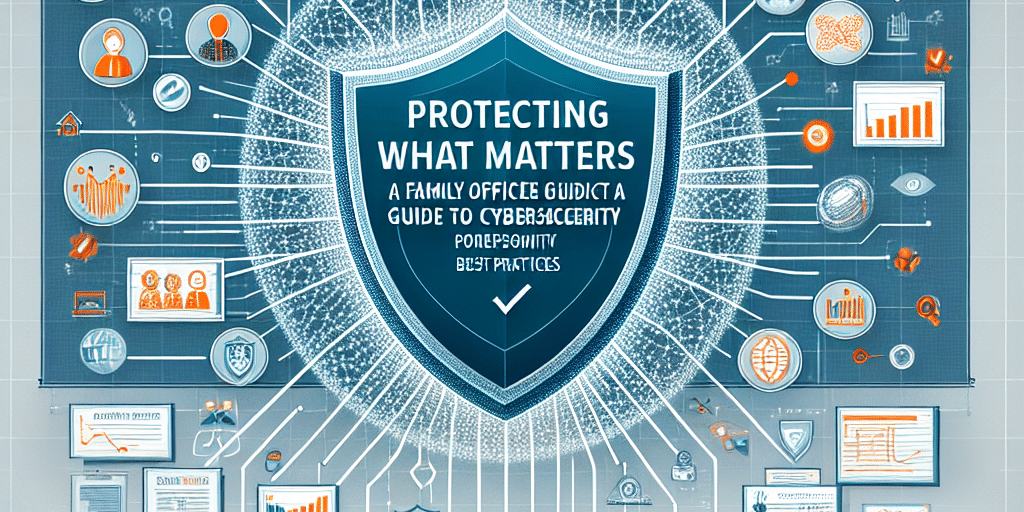In today’s rapidly evolving digital landscape, cybersecurity has become a pressing concern for individuals and families, especially for those operating within family offices. Family offices manage the wealth and affairs of ultra-high-net-worth families, often encompassing significant assets and sensitive information. As cyber threats continue to rise in sophistication and frequency, it is crucial for these families to implement robust cybersecurity measures to protect what truly matters.
This guide outlines essential cybersecurity best practices tailored for family offices, enabling them to safeguard their assets, data, and privacy.
1. Understanding the Cybersecurity Landscape
Before diving into specific practices, it is important to grasp the nature of the threats faced by family offices. Common threats include:
- Phishing Attacks: Fraudulent attempts to acquire sensitive information by masquerading as trustworthy entities.
- Ransomware: Malicious software that encrypts data and demands payment for decryption.
- Data Breaches: Unauthorized access to sensitive information due to inadequate security measures.
- Social Engineering: Manipulative tactics used by cybercriminals to trick individuals into divulging confidential information.
By understanding these threats, family offices can tailor their cybersecurity strategies accordingly.
2. Implement Strong Access Controls
One of the most effective ways to protect sensitive information is to implement stringent access controls. This includes:
- Multi-Factor Authentication (MFA): Require multiple forms of verification before granting access to systems and data. This could involve a password in combination with a fingerprint or OTP (one-time password) sent via SMS.
- Role-Based Access Control: Limit access to sensitive information based on the individual’s role within the family office. Ensure that only those who need access for their specific duties can obtain it.
3. Regularly Update Software and Systems
Ensuring that all software, including operating systems and applications, are kept up-to-date is a crucial component of cybersecurity. Updates frequently contain security patches to fix vulnerabilities. Family offices should implement:
- Automatic Updates: Enable automatic updates for all operating systems and software wherever possible.
- Regular Review Schedule: Establish a regular schedule for reviewing all software and systems to ensure they are current.
4. Data Encryption
Encrypting sensitive data is essential for protecting information in transit and at rest. This prevents unauthorized access, ensuring that even if data is intercepted or stolen, it remains unreadable without the key. Family offices should:
- Encrypt Sensitive Communications: Use encryption tools for emails and files exchanged with family members and advisors.
- Encrypt Data Storage: Ensure that sensitive data stored on devices or in the cloud is encrypted using strong algorithms.
5. Employee Training and Awareness
All family office staff, from administrative assistants to financial advisors, should be educated about cybersecurity threats and best practices. Regular training sessions can significantly reduce the risk of human error, which is often a major vulnerability. Training should cover:
- Recognizing Phishing Attempts: Teach staff how to identify suspicious emails and links.
- Safe Internet Practices: Encourage employees to practice caution when browsing the internet or using public Wi-Fi networks.
6. Incident Response Plan
No organization is completely immune to cyber threats; therefore, having an effective incident response plan is crucial. This plan outlines steps to take in the event of a cybersecurity incident, including:
- Immediate Response Procedures: Guidelines for reporting and responding to potential breaches.
- Communication Plan: A strategy for informing affected individuals and managing public relations.
- Recovery and Investigation Protocols: Procedures for restoring systems and conducting investigations to understand how the breach occurred.
7. Regular Security Audits
Scheduled security audits are vital for assessing current cybersecurity practices and identifying vulnerabilities. Contracting third-party cybersecurity firms can provide an objective evaluation. Regular audits should cover:
- Vulnerability Assessments: Identifying weak spots in the family office’s cyber defenses.
- Compliance Reviews: Ensuring adherence to applicable regulations, such as GDPR or HIPAA, depending on the nature of the data handled.
8. Secure Backup Solutions
Family offices should implement secure backup solutions for all critical data. Regularly backing up data ensures that family offices can restore their information in the event of a cyber incident, such as ransomware attacks. Backup strategies should include:
- Regular Backup Schedule: Establish a routine for automatic backups, ensuring that all critical data is saved frequently.
- Offsite and Cloud Backup Solutions: Utilize both physical offsite backups and cloud-based solutions to ensure redundancy.
Conclusion
As cyber threats become increasingly sophisticated, family offices must prioritize cybersecurity to protect their invaluable assets and personal information. By implementing these best practices and fostering a culture of cybersecurity awareness, family offices can effectively mitigate risks and safeguard what matters most. In a world where digital threats loom large, taking proactive measures today ensures a secure tomorrow for families and their legacies.










